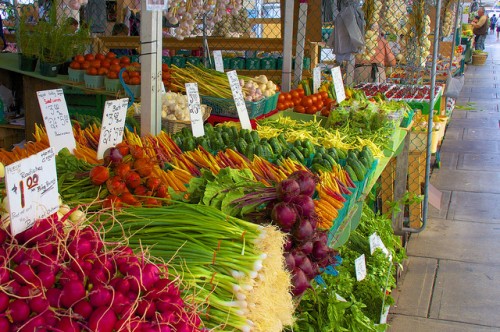
Buy some items slightly under-ripe
I’m a big banana lover. I’ve learned, though, that I do best when I buy bananas that are still slightly on the green side. This is especially true if I have one left and won’t start eating the new batch for a couple of days. The slight greenness will ripen by the time I’m ready to eat them, whereas if I buy them at their peak they’ll spoil too quickly. This holds true for many fruits that will continue to ripen after you bring them home. Grapes, tomatoes, and many berries will continue to ripen so buy them a little under-ripe if you’re not ready to use them immediately.
Buy from a farmer’s market
Produce at the grocery store was likely picked weeks ago and is nearing its end by the time it gets to the store. Farmer’s market produce, on the other hand, was likely picked within the last couple of days, meaning it has more freshness left in it.
Skip the damaged items
Unless you can eat or freeze them right away, skip the damaged items. Bruises and dings accelerate the decay process. Many fruits and veggies rely on their skin to keep air and bacteria at bay. If the skin is broken or bruised, it can’t do its job and the produce withers faster.
Avoid heat and sunlight
If you’re leaving produce out on the table or counter for easy reach, make sure it’s not in direct sunlight or near a heat source such as the stove. Too much heat and light accelerates the ripening and decay process.
Use the produce drawer in the fridge
The produce drawer controls humidity and moisture, which are detrimental to many fruits and vegetables.
Don’t wash until ready to eat
Moisture and humidity accelerate spoilage and invite mold. If you do wash prior to eating, make sure everything is completely dry before bagging it or putting it into storage containers.
Don’t store fruits and veggies together
Many fruits produce a gas called ethylene which can harm other fruits and vegetables. Don’t keep everything in one part of the fridge or next to each other on the counter.
Freeze some
If you end up with too much, many fruits and veggies can be frozen to extend their life. Berries are great for this. You can even freeze bananas (the skin will turn black, but the fruit will be fine).
Pick out the “bad apples”
If you notice some apples in the bag starting to go bad, or some grapes in the bunch starting to go soft and wrinkly, throw them away before they can harm the rest of the batch. Decay and mold will spread if you leave the bad in with the good. Anytime you see something starting to rot, be it fruit or a bad lettuce leaf, get it away from the others. Yes, it means some waste, but it’s better to lose a little than to lose the whole batch.
Use the right containers
Many greens should be stored in airtight but roomy bags. Many fruits should be stored in perforated plastic bags or kept in mesh bags. If you want to use storage containers rather than your crisper drawer, get those that are designed for produce storage. They control humidity much like the crisper drawer.
Emulate the grocery store
Look around the grocery store and notice how they store their produce. Things that are kept refrigerated at the store should be refrigerated at home, while things that are at room temperature should be stored that way at home. (Generally speaking. Many stores don’t refrigerate apples or berries, for example, but they can do just fine in the fridge.)
Regardless of how you store your produce, the most effective way to stop wasting money on produce gone bad is simply to buy it in smaller quantities. Don’t buy more than you know you can eat in a few days. Yes, it means more trips to the store, but that costs less than wasting hundreds of dollars worth of food every year.
(Photo courtesy of Jamie in Bytown)

Jennifer Derrick is a freelance writer, novelist and children’s book author. When she’s not writing Jennifer enjoys running marathons, playing tennis, boardgames and reading pretty much everything she can get her hands on. You can learn more about Jennifer at: https://jenniferderrick.com/.
Comments